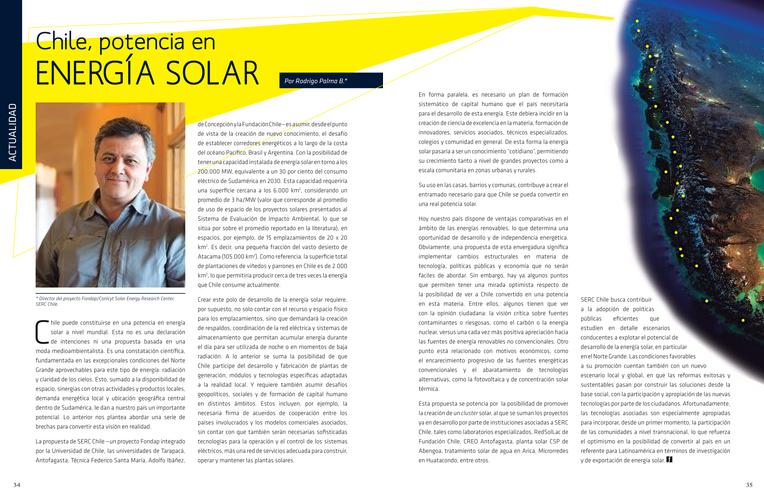
SERC Chile director was part of the recent issue of Beauchef Magazine, where he wrote the column “Chile, solar energy global powerful country,” and analyzed the exceptional conditions that our country has in order to become a center of development in renewable energies.
Those interested can have access to the full text clicking here.
Chile can become a solar energy powerful country worldwide. This is not a declaration of interests or a proposal based on an environmental trend. It is a scientific statement based on the excellent Great North conditions for this type of energy: radiation and clear skies. This, in addition to space availability, the synergies with other activities and local products, local energy demand and central geographical location within South America, give our country an important potential. What has been previously mentioned gives us an opportunity to address several gaps in order to make our dream come true.
The proposal of SERC Chile – a FONDAP project integrated by Universidad de Chile, Universidad de Tarapacá, Antofagasta, Técnica Federico Santa María, Adolfo Ibáñez, de Concepción and Fundación Chile – is to take on the challenge, from the point of view of knowledge creation, of establishing energetic corridors across the Pacific Ocean’s coast, Brazil and Argentina, which would bring the possibility of having an installed solar energy capacity of around 200,000 MW, equivalent to 30 per cent of the power consumption of South America in 2030. This capacity would require a 6,000 km2 surface, with an average of 3 ha/MW (a value which represents the average use of space in solar projects presented to the Environmental Impact Assessment, which places this figure above the average reported in the literature) in spaces, for example, of 15 20×20 km2 sites. That is to say, only a small fraction of the vast Atacama Desert (105,000 km2). As a reference, the total grapevine plantation and vineyard surface in Chile is 2,000 km2, which would allow the production of approximately three times Chile’s current energy consumption.
In order to create this solar energy development pole, it is necessary of course to have not only the resources and physical space for the sites, but also to have backups, power grid coordination and storage systems which allow storing energy during the day so that it can be used at night or at moments of low radiation. In addition, Chile has the possibility to develop and build generation plants, modules and specific technologies which can adapt to local reality. It also requires taking on geopolitical, social and human capital formation challenges in different areas. These include, for example, the need to sign cooperation agreements between the countries involved and the associated commercial models, without considering that sophisticated technologies will be necessary for the operation and control of power systems, plus an adequate service network in order to build, operate and maintain solar plants.
At the same time, it is necessary to create a systematic human capital formation plan which will provide to the country the professionals needed in order to develop this energy. This should impact the development of science excellency in this topic, training of innovators, specialized technicians, creation of associated services, schools and community in general. In this way, solar energy would become “common” knowledge, which would allow its expansion both in great projects and also at communal level in urban and rural areas.
The use of this energy in houses, neighborhoods and districts will contribute to create the necessary structure so that Chile can become a real solar global power.
Nowadays, our country possesses comparative advantages in relation to renewable energies, which gives an opportunity for energy development and independence. Obviously, a proposal of this scale implies implementing structural changes in technology, public policies and economy which will not be easy to address. However, there are already some points which allow having an optimistic view in relation to the possibility of the country becoming a global power in this area. Among these points, we have the opinion of the citizens: the critical insight about contaminating or risky sources, such as carbon or nuclear energy against a more positive appreciation of non-conventional renewable energies. Another point is related to economy, the continuous increase in the price of conventional energy sources and the decrease in price of alternative technologies, such as photovoltaic and solar thermal concentration.
This proposal is strengthen by the possibility of promoting the creation of a solar cluster, in addition to other development projects by SERC Chile associated institutions, such as specialized laboratories like Fundación Chile’s RedSolLac, CREO Antofagasta, Abengoa’s CSP solar plant, and solar water treatment in Arica, Microredes in Huatacondo, among others.
SERC Chile seeks to contribute to the implementation of efficient public policies which study scenarios in detail which will allow exploring solar energy development potential, especially in the Great North. The favorable conditions for its promotion also have a new local and global scenario, where successful and sustainable reforms only occur if solutions are based on social needs, with citizen participation and appropriation of new technologies. Fortunately, associated technologies are especially suitable to incorporate, from the start, the participation of the community at transnational level, which reinforces the optimism on the possibility of becoming a solar energy research exportation referent country in Latin America.


